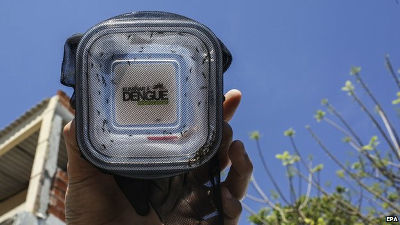Researchers say mosquitoes infected with Wolbachia significantly reduce dengue fever

In order to prevent dengue fever infection, researchers at the non-profit organization World Mosquito Program (WMP) are infecting mosquitoes with a bacterium called
Dengue rates plunged after release of lab-altered mosquitoes – DW – 10/31/2023
https://www.dw.com/en/dengue-rates-plummeted-in-colombia-after-lab-infected-mosquito-release/a-67268943
Male mosquitoes infected with Wolbachia may be unable to produce offspring when mated with uninfected females. WMP works to stop the spread of life-threatening vector-borne diseases such as dengue, Zika, and yellow fever by dispersing millions of Wolbachia-infected mosquitoes into areas where these diseases are common.
After testing infected mosquitoes in the Colombian city of Vero in 2015, researchers expanded their efforts to the nearby cities of Medellin and Itagua. By April 2022, it was reported that approximately 80% of mosquitoes in Vero and Itagui were infected with Wolbachia through interbreeding, and in Medellin approximately 60% were infected.

To find out whether this infection rate actually influenced the development of dengue fever, researchers looked at the number of cases reported up to July 2022. The results showed that dengue fever was reduced by up to 97% in each city compared to 10 years before the experiment began.
The Colombian effort is the largest in the world, and similar experiments are being conducted around the world. For example, in Indonesia, experiments have shown that dengue fever cases have decreased by 77%.

'Once you introduce a Wolbachia-infected mosquito into a native mosquito population, it stays there and the infection spreads,' said Rafael Maciel de Freitas, a biologist at the Bernhard Nocht Institute of Tropical Medicine in Brazil. However, there are concerns that this approach may not work forever, given that the mosquitoes that transmit dengue fever are likely to adapt to Wolbachia.'
At the time of the report, it was still unclear whether the decline in dengue fever detected in Colombia and other regions was solely due to Wolbachia-infected mosquitoes. WMP plans to expand its business over the next 10 years, and has announced plans to build a factory in Brazil in early 2023 that will infect approximately 5 billion mosquitoes a year with Wolbachia.

Related Posts:
in Creature, Posted by log1p_kr







